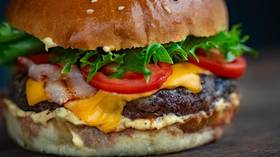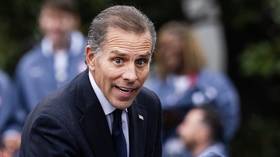Boris Johnson’s food policy strategist says meat tax ‘may be necessary’ but warns of FOOD RIOTS if brought in too soon – reports

After the UK’s government climate change advisers urged it to implement policy to reduce meat and dairy consumption, Boris Johnson’s hand-picked food strategy planner reportedly says a meat tax “may be necessary” in the future.
Restaurateur Henry Dimbleby, chosen to lead Downing Street’s ‘National Food Strategy’ formulation body, believes that a levy on processed meat staples like burgers, steaks, ham, sausages, and chicken nuggets could be needed in order to tackle climate change, according to media reports.
However, Dimblebly is expected to tell the prime minister not to introduce any such tax in the short-term because of the potential unrest it could lead to during the pandemic, according to The Sun.
Citing unnamed sources familiar with a draft document due to be released next month, the paper noted that ministers fear street protests over food prices similar to those conducted by the ‘Gilets Jaunes’ (Yellow Vest) movement in France in recent years.
Also on rt.com Fat Britannia: PM Johnson targets UK’s childhood obesity pandemic with ban on junk food TV adverts before 9pmThe sources also reportedly said the document was “still a work in progress,” but did not dispute that it would recommend making some meats pricier.
When the prospect of a meat tax was raised earlier this year, Johnson said there would be no such levy on his watch – despite clinging to his stated green agenda goal to make the country carbon neutral by 2050.
In April, Johnson committed to reducing the UK’s greenhouse emissions by 78% by 2035. This would reportedly require convincing the public to cut down meat and dairy intake by a fifth.
The average daily red meat consumption in the UK is 70g per person, according to the National Health Service, which also notes that a breakfast containing two typical British sausages and two bacon rashers is equivalent to 130g.
But the government’s Climate Change Committee (CCC) panel recommended this week that public consumption of meat and dairy needed to be reduced, for personal health as well as climate change, by 20% by 2030 and 35% by 2050.
Also on rt.com UK’s Dept for Education ridiculed by left for encouraging kids to celebrate One Britain One Nation Day… but some Brits love itCiting this issue among a number of the government’s failings to deliver on its climate change pledges, the advisory committee called on Johnson’s to formulate and implement evidence-based policies to encourage healthier diets with clear and fixed targets.
However, the majority of social media users were against any dietary restrictions being imposed on account of climate change, with several people labelling it a “ridiculous assertion.” One said it sounded like “more ridiculous wokery.”
A number of people argued that a better alternative would be reverting back to “local, seasonal produce,” which one commenter noted would be of more benefit to the climate change fight than “churning out frankenburgers from an artificial meat factory” and shipping those globally.
Others agreed that meat consumption should be reduced in general, since the kind most people eat is “pumped full of hormones.” Describing the British diet as “poor,” one person said that besides reducing meat, there was a need to “differentiate between different systems of production.”
The meat most people eat is absolutely not natural - it's pumped full of hormones. Fresh fruit and veg of the organic variety or grown in your garden is as natural as it comes. If you wish to eat meat it should be 2 or 3 times a week. As a nation in WW2 we were healthiest
— Mark (@TruthTeller1909) June 24, 2021
Picking on an element of the national diet, making it a scapegoat, isn't productive.The British diet is poor, the impacts of this are felt heavily by the NHS.We need to reduce, calories, including meat, but also need to differentiate between different systems of production.
— Brian Twose 🇫🇷 (@twose_brian) June 24, 2021
Think your friends would be interested? Share this story!













